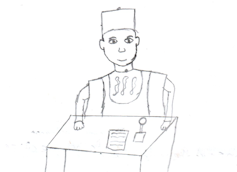A new ranking by UN Women and the Inter-Parliamentary Union puts Nigeria 179th out of 185 countries for the percentage of women in the national legislature.
Women currently make up only 3.9% of seats in the House of Representatives. In the Senate, three of the 108 current members are women. In the executive branch, women head eight of 45 (17.8%) of ministries.
This absence of women in prominent positions in politics subtly reinforces societal biases and moulds public opinion, which subconsciously excludes women from political leadership.
We are a group of researchers who have expertise in gender and African politics and childhood political socialisation. We have been researching the political socialisation of children in Nigeria for the past three years.
Our research in Ogun State reveals that children are internalising what they see on the political stage. We asked children aged 5 to 16 at 12 schools in Ogun State to imagine and draw a leader such as a president, governor, or member of a national or state assembly at work. Only 5% of 981 children drew a woman as a political leader.
Ninety-two percent of girls drew a man, compared to 98% of boys.

Why do so few children draw women as political leaders? Children absorb the power dynamics and gender roles they observe in political happenings, shaping their understanding of politics.
In democracies, a lack of women interested in politics, as well as running for and winning political office, matters. If women are absent in decision-making spaces, their concerns might not be considered. While men can represent women’s interests, women committed to change can draw on their experiences and those of women in their networks to bring new ideas to the table.
Women in authority in Nigeria
We conducted our study in the three senatorial districts of Ogun State, one of Nigeria’s 36 states. In Ogun State, the deputy governor, Noimot Salako-Oyedele, is a woman, and her picture is on many classroom walls.
The late anti-colonial activist and leader Funmilayo Ransome-Kuti was from Ogun State too. The presence of visible women leaders could encourage some children in the state to imagine and depict women as political leaders. Thus, it is possible that our sample of children were more likely to draw a woman than children in other states.
Six other states have women deputy governors: Akwa Ibom, Ebonyi, Ekiti, Kaduna, Plateau and Rivers States.
But women’s representation in state assemblies throughout the country is low. No woman has ever been elected to be a governor in Nigeria.
In our study, we asked children what jobs they would like to have in the future. In general, boys were more interested in jobs in politics (president, governor, local government chair) than girls were. For the specific job of president or governor, however, girls seemed to be just as interested as boys.
The children’s response isn’t specific to Nigeria. In a study conducted in 2017 and 2018 in the United States (where 19.3% of members of the House of Representatives at the time were women), only 13% of children drew a woman political leader.
Broader forces
Multiple factors hinder women’s representation in elected offices in Nigeria. These include political party practices that favour the recruitment and selection of men candidates, the high costs of running for office, as outlined in Ayisha Osori’s book Love Does Not Win Elections, and societal biases against women holding positions of political power.
Deeply entrenched societal biases add to the challenges. Cultural norms assign leadership roles to men and certain religious interpretations restrict women’s public participation.
The perception that women are more suited for domestic roles, or lack assertiveness, impedes their ability to garner support for political leadership.
Low numbers of women representatives also suggest there are systemic biases in the democratic electoral process.
Children pay attention
Recent research shows that when girls observe women in political power or running for political office, they are more engaged in politics later in life. This suggests that positive exposure to women in politics may have positive effects on girls’ political engagement. Negative exposure could have negative effects.
Take, for example, the “Natasha-Akpabio case” in Nigeria. Senator Natasha Akpoti-Uduaghan alleged that Senate president Godswill Akpabio had sexually harassed her. The Senate president denied the allegation. Akpoti-Uduaghan was suspended from her position by the Senate ethics committee for what it described as misconduct and disregard for the Senate standing orders.
Experiences like those may influence future generations’ understanding of gender equality in leadership. When young Nigerians observe powerful women facing harassment and retaliation for voicing their concerns, it may undermine the notion that women are equally capable of political authority.
Girls may internalise the idea that politics is a hostile space for women. For boys, seeing women leaders undermined might reinforce a sense of male dominance.
Policy solutions
Our finding that children largely see politics as a “man’s world” prompts reflection on societal and political biases. To address the under-representation of women in political leadership positions in Nigeria, it is important to invest in civic education programmes. Children should be helped to understand the significance of equitable political participation from an early age.
Campaigns should use different media platforms to challenge gender stereotypes in leadership.
Finally, enacting and enforcing legislated gender quotas across all levels of Nigerian government and within political parties is a crucial step to improve the representation of women in leadership positions.
Sources: https://theconversation.com/

